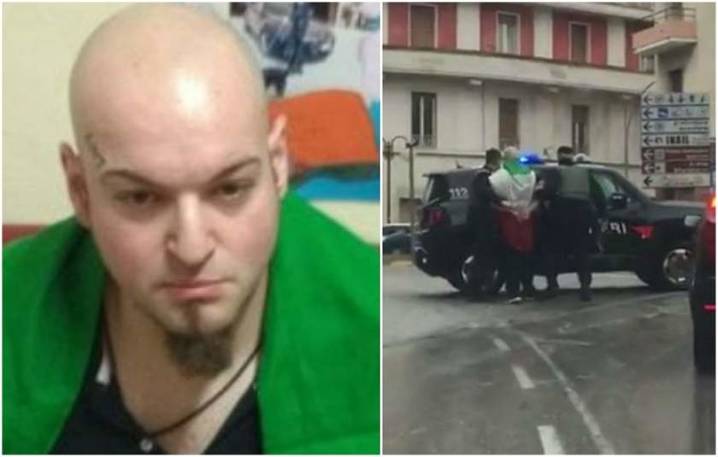


ROME -- The Macerata shooting of immigrants Feb. 3 casts a dark shadow over forthcoming national general elections, which take place March 3. It made worldwide news that Luca Traini, 28, a psychiatric patient and former local candidate for the Northern League, rammed his car through the Central Italian city of Macerata, shooting with a pistol at any dark-skinned individual he saw and at locales frequented by migrants. He struck six but fortunately killed none. When arrested, Traini, draped in an Italian flag, gave a Fascist salute.
His aim, Traini said, was to avenge the brutal murder of Pamela Mastropietro, 18, killed and her body dismembered allegedly by a Nigerian illegally in Italy named Innocent Oseghale, now under arrest in Pollenza, near Macerata. Citizens there said in interviews that their city is normally peace loving, but that the brutal earthquake of October 30, 2016, whose epicenter was nearby Norcia, left many extremely tense and that some victims still live in containers.
The Macerata shootings were themselves a quake in an already tense pre-election run-up all over Italy. Matteo Salvini is courted as a centerpiece of a potential future rightwing coalition with former premier Silvio Berlusconi's Forza Italia. Salvini, although once photographed with Traini, says he has no recollection of the Macerata shooter being a candidate of his party, the former Northern League now called the Lega Salvini Premier. However, Salvini went on to say, "Hatred and violence are instigated by those who fill Italy with clandestines. If immigration weren't out of control and [the migrants] full of delinquents, certain things wouldn't happen."
A public debate Feb. 2 -- one day before the Macerata shootings -- was held in a hall of the Roman Senate on "the migration flux phenomenon, which risks putting into discussion the foundations of our civilization and our democracy." Moreover, said the organizers approvingly, "some politically centrist intellectuals" in Italy and France are organizing a campaign to combat "the impact that the indiscrimate migratory flux can have on Europe."
Episodes of anti-immigrant violence have become more common than in the past. Although Pamela's mother, in a formal statement to the press, said that, "Violence cannot be the response to the violence that we have suffered," the violence continued in Macerata: the car of a priest who worked with immigrants was smeared with swastikas. At Caserta in November 2016 four Italians armed with brickbats swarmed into an immigrant hospitality center. Screaming, "Negro bastards," they assaulted 18 migrants, mostly from Mali. Two months later the father of one of the attackers tried to set fire to the center.
At the same time, some of the dislike of those considered outsiders has spilled over into anti-Semitism. Two young children in different Italian towns were attacked by gangs in incidents that disappeared from the press almost instantly. One was a boy of seven who, wearing a yarmulka, he was pushed to a sidewalk and beaten.
Such incidents reflect a generalized increase in anti-Semitism in Europe, especially Germany and France, where one out of every three racist attacks is anti-Semitic, according to Israeli Minister Naftali Bennet. For Bennet, this renewed anti-Semitism is caused by the waves of migrants including Muslim refugees plus the strength of the social media, and is reflected in the rise in the extreme right. In fact, an Ipsos survey published in Corriere della Sera Sept. 27, 2017, showed that two out of three Italians consider Islam "incapable of adapting itself to the present" and "a threat to the future."
In his new book "Immigration: Cambiare Tutto," author Stefano Allievi, sociologist with the University of Padua and expert on Islam, pleads for Italy to deal more seriously with immigration, beginning with a change in its division between economic migrants and political asylum seekers, "a fictitious and counter-productive distinction" invented by the European Union. Only those who say they seek political asylum can legally be granted it, which obliges them to say this, whether true or not. Allievi also attacks the concept of border control, which amount to deciding arbitrarily who can and cannot enter. "We must sort out the criteria for this choice," he says -- university degree or work experience, or simply create a national quota system. For Allivi in Italian, see https://www.youtube.com/watch?v=2bye8gKhefE
Nevertheless, the latest Interior Ministry statistics show a clear decline in migration. In the the month of Jan. 1 - Feb. 2,, 2018, migration fell by 13.59% over the same period in 2017, and by 21.l7 over 2016. Most entering Italy that month were from sub-Sahara Africa, and especially Eritrea (1,184), which, as Ethiopia, had been an Italian colony between 1890 and 1941. From Nigeria came 212, Cote d'Ivoire 180, Sudan 126, Senegal 166 and Guinea 132. The others arrived from North Africa, and especially Libya (204). A limited number (284) are from Pakistan while another 1,330 from Syria, Bangladesh and elsewhere. Obviously not all the arrivals stay in Italy; many continue on to Germany, the Netherlands, Sweden and Switzerland, under the EU relocation plan.
And it is important to recall that not all the current episodes are hate filled. Andy Nganso, 30-year-old from Cameroon and a graduate from an Italian university, works as a doctor at Camu near Como. An Italian woman brought into the emergency room, seeing him, cried, "I won't be touched by a black!" His reply: "Good -- I can take a coffee break." His sarcasm wound up on Facebook, with cheers rather than jeers for his calm response.
Source URL: http://440468.6bgr9ubv.asia/magazine/focus/op-eds/article/macerata-shootings-cast-shadow-over-general-elections
Links
[1] http://440468.6bgr9ubv.asia/files/maceratajpg-1